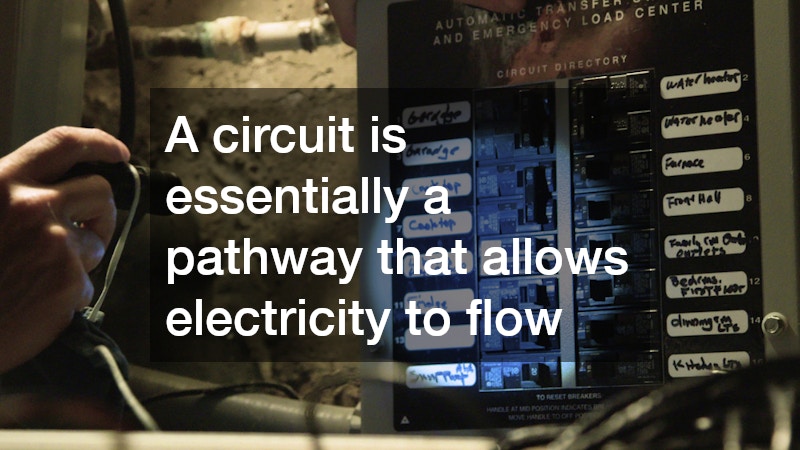If you own a home, it can be helpful to cultivate a comprehensive understanding of the basics of electricity, represented through insights from residential electricians. Electricity is a fundamental aspect of modern life, influencing everything from our home appliances to lighting systems. As a homeowner, grasping the basic principles of electricity can empower you to tackle simple household tasks and even help in emergencies. Residential electricians play a vital role in ensuring that our electrical systems are safe and functional.
Their expertise can demystify the complexities of household wiring, circuitry, and safety protocols. In the following sections, we will cover various aspects of electricity to deepen your understanding and appreciation of this essential utility.
The Principles of Electricity
Understanding the fundamental principles is essential for anyone working with or interested in electricity. Voltage, current, and resistance are the cornerstones of electricity, each playing a distinct role in creating an electrical circuit. Voltage is effectively the pressure that pushes electrical current through the circuit, while current is the flow of electrons, and resistance is the opposition to that flow.
When you familiarize yourself with these concepts, you gain insight into how different electrical devices function. For instance, the relationship between voltage and current is governed by Ohm’s Law, which is pivotal when calculating the power consumption of devices around your home. It is particularly important to understand these principles for safe handling and troubleshooting of electrical equipment.
Moreover, these principles are not just theoretical; they manifest in practical applications throughout your home. From switching on a light to charging your phone, basic electrical principles govern daily activities. Recognizing these simple processes can help homeowners make informed decisions regarding energy use and maintenance of their electrical systems.
The Way Circuitry Works in a Home
A circuit is essentially a pathway that allows electricity to flow to various devices within your home. Understanding how these circuits operate is critical to efficient electrical usage. In many homes, electrical systems are set up as either series or parallel circuits. Series circuits have components connected one after another, while parallel circuits connect components across common voltage points. This section will help you identify which setups are present in your home and their advantages or disadvantages when it comes to power distribution.
Furthermore, circuit breakers serve an essential purpose in household circuits. These safety devices automatically shut off the electrical flow when they detect irregularities, preventing potential hazards such as fires or electrical shocks. Understanding the role of circuit breakers can help you appreciate the importance of maintaining your electrical system in optimal condition.
The Basics of Electrical Safety
Electrical safety is critical in preventing accidents and ensuring a safe environment. Simple precautions can go a long way in protecting oneself and one’s property from electrical hazards. Knowing how to properly use electrical devices and understanding their limitations are key elements of electrical safety.
Common safety tips include regularly inspecting cords and plugs for damage, avoiding overloading power outlets, and ensuring that outlets in wet areas are GFCI (Ground Fault Circuit Interrupter) protected. Education around these points can significantly reduce the risk of electrical accidents occurring within a home.
The Signs You Need a Residential Electrician
Knowing when to seek professional help is crucial for safety and efficacy. Certain electrical issues require the expertise of a licensed electrician. Understanding this can save lives and ensure compliance with local electrical codes.
For minor issues, such as replacing a light bulb or resetting a tripped breaker, many homeowners may feel confident tackling those on their own. However, for major projects like rewiring or installing new circuits, consulting a licensed electrician is essential. Attempting such tasks without proper knowledge and tools can lead to dangerous situations.
Another scenario that often warrants a call to a professional is when you encounter persistent issues, such as circuit overloads or continuously tripping breakers. These problems are typically signs of more significant electrical faults that must be diagnosed and fixed by a qualified electrician. Knowing the right time to call for help can mitigate hazards and ensure your home remains a safe environment.
By understanding the fundamental aspects of electricity and recognizing key questions and topics, homeowners can take informed steps towards managing their electrical systems. With a solid grasp of electrical principles, circuitry, safety measures, and common issues, you will be better prepared to navigate the electrical needs of your home. This journey of learning about electricity can transform you from being a passive consumer of electrical energy into an informed participant in your household management.
The role of residential electricians extends beyond providing a service; they are key contributors in fostering an understanding of electrical safety and efficiency among homeowners. Engaging with this knowledge can positively influence your home environment and your overall relationship with electrical systems. When you understand the basics of electricity, you create a safer home environment.


